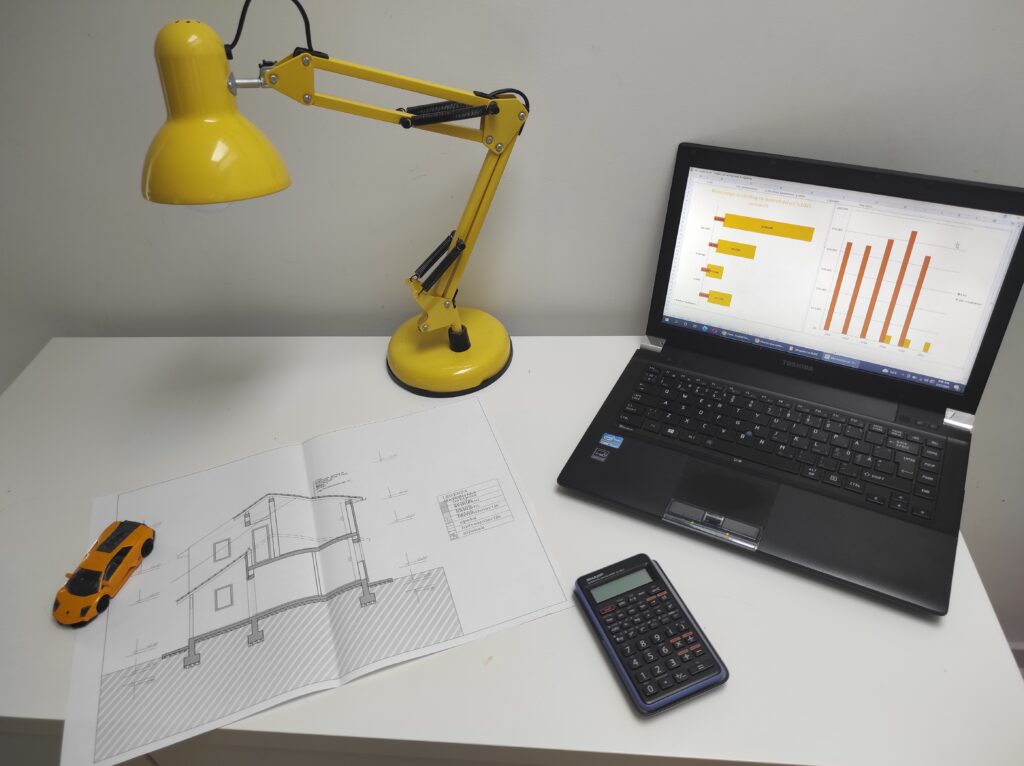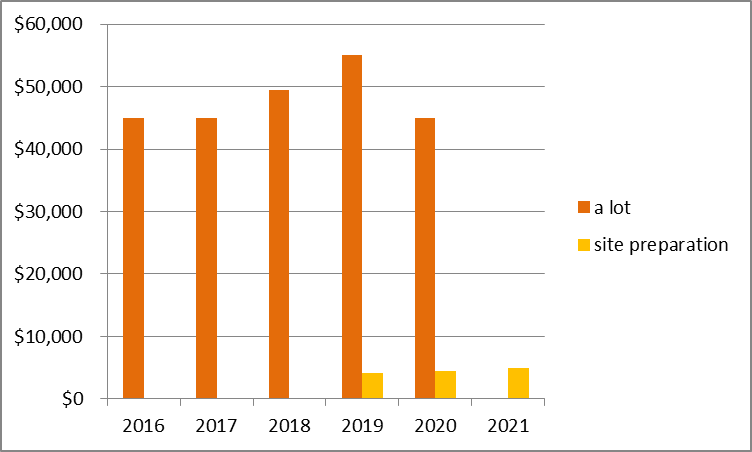Building a brand-new home may sound like a dream come true. You get to choose the ideal layout for your family’s needs, and have a say in each and every design element. This is also an expensive and challenging so many people entrust professional contractor the process. On the other hand, being your own general constructor may gain you a lot of benefits! This comes with serious risks, challenges and difficulties especially if you’ve never done it before. In this article we will deal with the analysis of all this with the aim that after reading it you will be able to see the overall picture and correctly make the decision that is best for you.

Which are the benefits of building a home yourself – as a general constructor?
Being your own general house contractor brings many advantages and benefits, all of which can be classified into four groups: financial, technical, emotional and experiential. We will list all the most important ones:
Financial
1. Financial savings: The savings you can achieve in this way are substantial. The basic calculation refers to 20 to 25% of the total price that builders charge as a profit margin. Nevertheless, when you include in the possible savings from acquiring materials (Despite the fact that many people claim that it is easier for professionals to save money on materials, this does not imply that the entire amount saved will end up in your pocket. And yet, it is not true that you will not be able to save money while acquiring supplies yourself; you will simply do so in a different way) and completing easier and simpler operations on your own, the total targeted savings can range from 35 to 50%. Realistically, you won’t save more than a quarter of the overall cost, but taking into account the typical cost of construction, we’re talking about roughly $100,000 here. A bit?
2. Financial flexibility: If you hire a professional general contractor, you must pay him in full. If you take on the challenge of being your own general contractor, you will be able to pay different suppliers and subcontractors in various methods.
3. Convenient timeline: Depending on your personal cash flow, you can decide to divide the construction into phases and take as much time as you need between them. As a result, you extend the entire construction time while easing the payment.
Technical
4. Better quality control: Only if you personally supervise the construction, you will have complete confidence in the quality of the installed materials and the job executed.
5. Higher overall quality: Despite the fact that you are not an expert in this area, your overall building quality can easily exceed the level of a professional simply due to devotion and motivation.
Emotional
6. Pride and joy: It is unnecessary to go into detail about how much emotional connection is achieved through active participation in construction. Not just you, but also your family members, will have different feelings about the structure they made themselves compared the one they simply bought. The house is turned into a home.
7. Getting exactly what you want: At first sight, it appears that organizing the construction of the house yourself is not required in order for it to be exactly the way you want it. Only, think about it! Is it enough to tell the architect what kind of house you want and got it, or do you need to get more involved in the design process and provide constant guidelines? It’s the same with constructing.
Experiential
8. Gaining valuable experience: The experiences gained as the main contractor during the house construction are priceless. These can mean a great deal to you if you decide to rebuild a house, create a lakeside retreat, or advise your children in the future… Also, regardless of your profession, project management of such kind can be applied in your career.

What are the problems that owner-builders face?
Getting to grips with the organization of building a house is not an easy task; in fact, it is a difficult and demanding one. Most people are terrified by the idea of having to deal with this. People are afraid of the unknown! The biggest unknown is – what can go wrong? There is no definitive list, and even the most experienced project managers will face surprises, but you should be proactive and meet the difficulties. As someone with nearly two decades of experience managing multiple projects and building three houses of his own, I will outline the most common construction challenges:
- During foundation excavation, the excavator comes across a rock.
- The hydraulics on the excavator broke while working on the foundation excavation.
- The foundation is poured out of square and out of level, since the subcontractor’s machinist is inexperienced.
- A drainage swale does not function properly and must be totally regarded after the house and yard are finished.
- The supplier sends a whole tow truck of bricks that are the wrong size.
- The window openings in the walls were installed at the wrong height.
- Construction site workers consume alcohol.
- The wooden structure used to build the roof structure is contaminated with weevils.
- Delivered windows or doors that open on the incorrect side.
- There was no drainage hole left when the balcony in the attic was poured.
- Various workplace injuries.
- Two escaped and vicious dogs attacked the workers and stepped on the fresh concrete as the foundation was being poured.
- Halfway through the construction process, a neighbor from the next lot arrives to complain that the building being constructed is too close to his property and that the geodetic measurements were inaccurate. (after re-measurement, of course, it turns out that he was wrong).
- A powerful storm throughout the night severely damages the unfinished and incompletely bonded roof.
- My leg got stuck and fell through a rotten deck on the scaffolding while making minor adjustments to the roof railing. It was a Sunday, and I was alone. A mobile phone was on the ground. There was no one around (don’t ask how I got away with it).
The list can go on and on…

What skills are required to be an owner-builder?
While some of a contractor’s work is done on the project site, the majority of the work is done in advance to guarantee that things flow well on the worksite. This involves evaluating plans to identify potential issues and the best way to complete the job; estimating material and labor costs; securing material quotes; obtaining permits and approvals; hiring, scheduling, and managing employees and subcontractors; scheduling inspections; ordering materials and scheduling deliveries; and tracking accounts payable and receivable to keep the whole thing afloat.
The GC is the boss, and he is the person who is called when things go wrong in most organizations. And they will, in some small or large form, because no one is that lucky. The better the planning, the less hassles and surprises there will be. Yet, given your lack of construction experience, you may expect more than your fair share of surprises and troubles.
Start small: If you have the opportunity, I would strongly advise you to run one or two smaller works first, such as refurbishing your current home, before constructing a new one. Even though the task will be considerably smaller and less complicated, go through all of the same processes as you would for a new home to get a sense of the work needed and the types of complications that may arise.
Why shouldn’t you be own general constructor?
- Actual savings are sometimes less than anticipated.
- The project will most likely require more time and effort than you anticipate.
- The project will very certainly have more complications than you anticipate.
- Due to your lack of experience, the quality of your construction may decrease.
- There will be no one to blame but yourself for anything.
- Obtaining a construction loan may be difficult.
Almost every work is a learning experience – and you will learn a lot on this first job which you can apply later if you are crazy enough to do it again, like me!
Conclusion. This is a reasonable option if you’re well-organized and a decent businessman, have the time and energy, and have a general understanding of how houses come together. You must also be willing to devote the time required to learn about permitting, estimating, scheduling, contracts, insurance, and work-site management — and then devote a significant amount of time to managing the job. In fact, your most important involvement is in the planning stages: permitting, fine-tuning the designs and specifications, selecting materials, budgeting, obtaining bids, lining up subs, negotiating with suppliers, and scheduling the construction – basically everything we write about on our website. If you’ve done everything correctly, the construction process should go smoothly which is exactly what you want. I can’t promise that everything will go smoothly, but most subcontractors know their jobs well, and with one experienced carpenter or production manager on site to fix the occasional hiccup, you can expect the project to go as planned.
